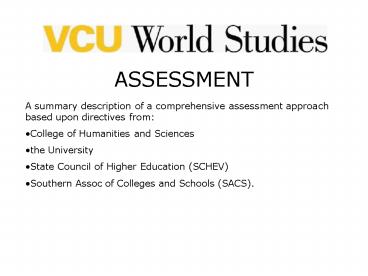ASSESSMENT - PowerPoint PPT Presentation
1 / 17
Title:
ASSESSMENT
Description:
College of Humanities and Sciences. the University. State Council of Higher Education (SCHEV) ... The bulk of assessment will be School-wide and handled by the ... – PowerPoint PPT presentation
Number of Views:35
Avg rating:3.0/5.0
Title: ASSESSMENT
1
ASSESSMENT
- A summary description of a comprehensive
assessment approach based upon directives from - College of Humanities and Sciences
- the University
- State Council of Higher Education (SCHEV)
- Southern Assoc of Colleges and Schools (SACS).
2
ASSESSMENT
The bulk of assessment will be School-wide and
handled by the Director of Undergraduate
Programs. Only a small portion is discipline
specific and should be kept as simple as possible.
3
- OBJECTIVES/GOALS
- Provide our students
- the knowledge, skills, and experience necessary
for success in an increasingly interdependent,
globalized 21st century - Sensitivity to the values, beliefs, and
structures of other cultures - The ability to live and work alongside those who
are perceived as different from oneself, and to
recognize similarities among all humans.
4
LEARNING OUTCOMES The following SWS LEARNING
OUTCOMES are based on our goals and those of the
university, including requirements specified by
SACS and SCHEV.
5
- Experiential learning
- International experience
- Interdisciplinary foci
- Advanced language skills
- Oral communication
- Writing intensive
- Technology skills
- Global good citizenship and ethics
- Scientific literacy
- Critical thinking
- Student engagement
6
- EXISTING AND NON-DISRUPTIVE MEANS TO COLLECT
ASSESSMENT DATA - SYLLABI speak to SWS learning outcomes and will
provide raw data for assessment. - 2. WORLD PASSPORT-speaks to SWS learning outcomes
and will provide raw data for assessment. - 3. SENIOR SEMINAR- speaks to SWS learning
outcomes and will provide raw data for assessment.
7
EXISTING AND NON-DISRUPTIVE MEANS FOR COLLECTING
ASSESSMENT DATA 4. COURSE EVALUATIONS- Review and
comparison of student/faculty evaluations speak
to SWS learning outcomes and provide raw data for
assessment. 5. MATRIX 6. FACULTY PORTFOLIOS- A
review of faculty portfolios speaks to SWS
learning outcomes and will provide raw data for
assessment.
8
EXISTING AND NON-DISRUPTIVE MEANS TO COLLECT
ASSESSMENT DATA 7. Student Portfolios-
individual program portfolios should reflect
assessment goals and be kept as simple and
painless as possible. School-wide assessment
will already be measuring most program goals such
as program content, writing skills, critical
thinking and so on.
9
EXISTING AND NON-DISRUPTIVE MEANS TO COLLECT
ASSESSMENT DATA 8. TEACHING PORTFOLIOS 9.
TRANSFER SURVEYS 10. ALUMNI TRACKING
10
DEVELOPING PROGRAM-SPECIFIC LEARNING OUTCOMES 1.
Rubrics. Use rubrics developed by Dean's office
for the SACS review to assess student outcomes in
courses with writing, oral components, etc. A
review of the rubrics speaks to SWS learning
outcomes and will provide raw data for assessment.
11
- DEVELOPING PROGRAM-SPECIFIC LEARNING OUTCOMES
- 2. Consider both
- Experiential Learning Outcomes and
- Individual Course Learning Outcomes
12
HOW CAN ASSESSMENT BE USEFUL? 1. CONTINUOUS
QUALITY IMPROVEMENT 2. DISSEMINATE the results
of assessment. 3. YEAR END REPORT 4. ANNUAL
FACULTY EVALUATIONS 5. WEAVE
13
- USING WEAVE
- Write expected outcome/objectives
- Establish criteria for success.
- Assess performance against criteria.
- View assessment results.
- Effect improvements through actions.
14
What does this mean for our individual faculty?
Very little beyond what we are already
doing. The best assessment plans are easy and
provide compensation in order to assure
completion.
15
Specific Recommendations for Faculty 1. Get the
message out to students in all course syllabi,
brochures, web site, Academic Advising Office,
etc. 2. Provide copies of all syllabi to
Lee. 3. Do class evaluations as usual, adding in
your own assessment of how each course might
address the general education goals listed.
16
- 4. Continue or develop a Senior Seminar
including - Review of World Passport
- Exit survey
- 5. Compile teaching portfolios.
- 6. Continue advising, with addition of checking
off the Passport. - 7. Faculty should meet together at least once a
semester to discuss how things are going and if
any changes might be called for.
17
- Our assessment plan allows for
- Ease of accomplishment
- Compensation through Senior Seminar courses
- Contribution to yearly evaluation
- Regular feedback and improvement
- Win/win/win scenario for students, faculty and
program































